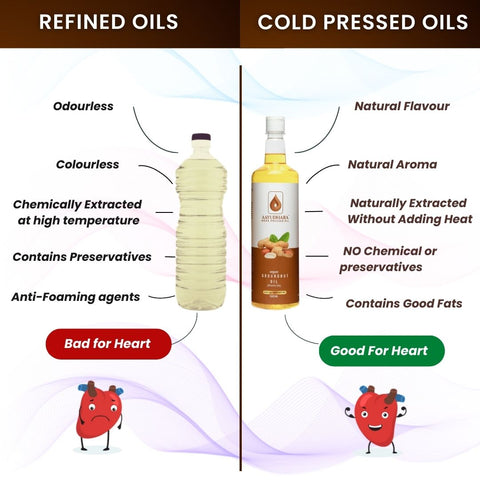Cold Pressed Oils vs. Refined Oils: Understanding the Key Differences
When it comes to choosing the right oil for cooking and various culinary purposes, it's important to understand the key differences between cold-pressed oils and refined oils. These two types of oils undergo different extraction processes, resulting in distinct characteristics and nutritional profiles.
In this article, we will delve into the world of oils, exploring the differences between cold-pressed oils and refined oils, and uncovering the benefits of opting for cold-pressed varieties.

What are Cold-Pressed Oils?
Cold-pressed oils are extracted from seeds and nuts using a mechanical process that involves crushing and pressing them at low temperatures. This method of extraction ensures that the natural flavor, aroma, and nutrients of the seeds are preserved, resulting in oils that retain their original properties.
The extraction process does not involve the use of heat or chemical solvents, making cold-pressed oils a healthier alternative to refined oils.
The Extraction Process: Cold Pressing
Cold pressing involves crushing the seeds or nuts and then applying pressure to extract the oil. The process is typically carried out using hydraulic presses or screw presses. The low temperature ensures that the oil is not exposed to excessive heat, which can degrade its nutritional content and alter its flavor.
Cold-pressed oils are typically produced in small batches to maintain quality control and preserve the integrity of the oil.
Nutritional Benefits of Cold-Pressed Oils
Cold-pressed oils are known for their rich nutritional profiles. The gentle extraction process helps to retain the natural antioxidants, vitamins, and minerals present in the seeds and nuts. These oils are a great source of essential fatty acids, such as omega-3 and omega-6, which are vital for maintaining a healthy heart and promoting overall well-being.
Additionally, cold-pressed oils often contain higher levels of beneficial compounds, such as phenols, carotenoids, and tocopherols, which have antioxidant and anti-inflammatory properties.
Why Choose Cold-Pressed Oils?
Retained Nutritional Value: The cold-pressing method ensures that the oils retain their natural nutrients, making them a healthier choice for your cooking and dietary needs. The vitamins, minerals, and antioxidants present in cold-pressed oils contribute to their potential health benefits –
- Unadulterated and Pure: Cold-pressed oils are free from additives, chemicals, and preservatives. The extraction process does not involve any refining or bleaching, allowing the oils to maintain their natural color, flavor, and aroma.
- Rich Flavor and Aroma: Cold-pressed oils are known for their distinct and intense flavors. Whether it's the nutty taste of cold-pressed almond oil or the robust flavor of cold-pressed olive oil, these oils can elevate the taste of your dishes and add a unique touch to your culinary creations.
What are Refined Oils?
Refined oils, on the other hand, undergo a more intensive extraction process that involves refining, bleaching, and deodorizing. The aim of refining oils is to remove impurities, enhance their shelf life, and create a more neutral flavor profile.
This process often involves the use of high temperatures, chemical solvents, and filtering agents.
The Extraction Process: Refining
Refined oils are typically extracted using methods such as solvent extraction or high-temperature mechanical pressing. These processes involve the use of heat, chemicals, or a combination of both to extract the oil from the seeds or nuts.
After extraction, the oil undergoes further refining steps, including degumming, neutralization, bleaching, and deodorizing, to remove impurities, color, odor, and flavor.
Nutritional Differences: Cold-Pressed vs. Refined Oils
Refined oils generally have a longer shelf life due to the refining process, which removes impurities that can cause rancidity. However, this refining process also results in the loss of some natural nutrients and beneficial compounds found in the seeds or nuts. Refined oils tend to have a milder flavor and a higher smoke point, making them suitable for high-heat cooking methods.
Understanding Smoke Point
The smoke point of an oil is the temperature at which it starts to smoke and break down, releasing harmful compounds and producing an unpleasant smell. Cold-pressed oils, due to their minimal processing, often have lower smoke points compared to refined oils. It's important to consider the smoke point when choosing an oil for cooking methods such as frying or sautéing. Refined oils with higher smoke points are more suitable for high-heat cooking, while cold-pressed oils are better suited for low-heat cooking or as finishing oils for salads and drizzling.
Making an Informed Choice
When it comes to selecting the right oil for your culinary needs, understanding the differences between cold-pressed oils and refined oils is crucial. Cold-pressed oils offer a range of benefits, including retained nutritional value, unadulterated purity, and distinct flavors. They are ideal for those seeking natural, wholesome options that enhance the taste and nutritional value of their meals. Refined oils, on the other hand, may be preferred for their longer shelf life, milder flavors, and higher smoke points.
Incorporating cold-pressed oils into your cooking routine can be a step towards healthier and more flavorful meals. The natural extraction process, combined with the retention of essential nutrients, sets cold-pressed oils apart from their refined counterparts.
By making an informed choice, you can elevate your culinary experiences and promote a healthier lifestyle with the goodness of cold-pressed oils.












Leave a comment
This site is protected by hCaptcha and the hCaptcha Privacy Policy and Terms of Service apply.